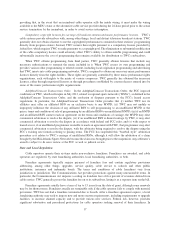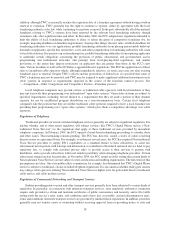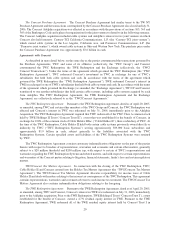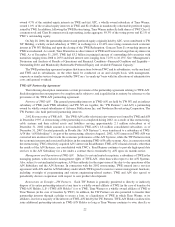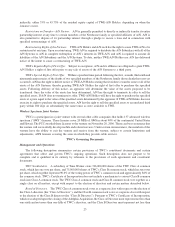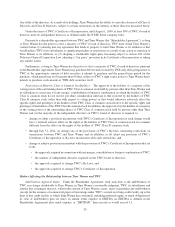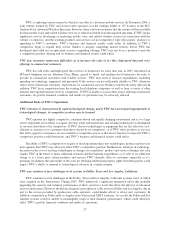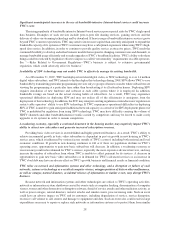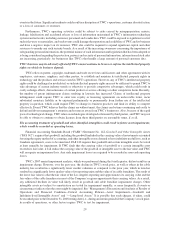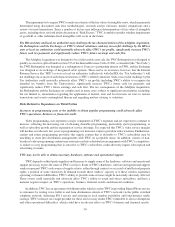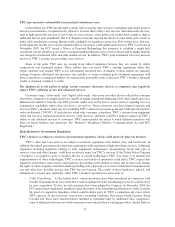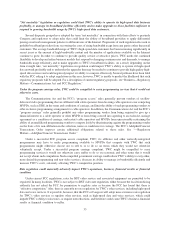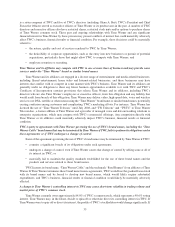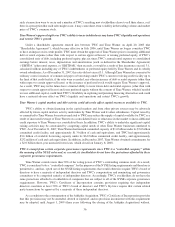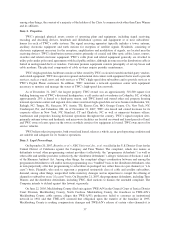Time Warner Cable 2007 Annual Report Download - page 32
Download and view the complete annual report
Please find page 32 of the 2007 Time Warner Cable annual report below. You can navigate through the pages in the report by either clicking on the pages listed below, or by using the keyword search tool below to find specific information within the annual report.TWC is exploring various means by which it can offer its customers mobile services. In November 2006, a
joint venture formed by TWC and several cable operators was the winning bidder of 137 licenses in the FCC
Auction 66 for Advanced Wireless Spectrum. However, there can be no assurance that the venture will successfully
develop mobile voice and related wireless services or otherwise benefit from the acquired spectrum. If TWC incurs
significant costs in developing or marketing mobile voice and related wireless services in connection with the
venture or otherwise, and the resulting products and services are not competitive with other parties’ products or
appealing to TWC’s customers, TWC’s business and financial results could suffer. In addition, if TWC’s
competitors begin to expand their service bundles to include compelling mobile features before TWC has
developed and rolled out an equivalent or more compelling offering, TWC may not be in a position to provide
a competitive product offering and its business and financial results could suffer.
TWC may encounter unforeseen difficulties as it increases the scale of its video, high-speed data and voice
offerings to commercial customers.
TWC has sold video and high-speed data services to businesses for some time and, in 2007, introduced an
IP-based telephony service, Business Class Phone, geared to small- and medium-sized businesses. In order to
provide its commercial customers with reliable services, TWC may need to increase expenditures, including
spending on technology, equipment and personnel. If the services are not sufficiently reliable or TWC otherwise
fails to meet commercial customers’ expectations, its commercial services business could be adversely affected. In
addition, TWC faces competition from the existing local telephone companies as well as from a variety of other
national and regional business services competitors. If TWC is unable to successfully attract and keep commercial
customers, its growth, financial condition and results of operations may be adversely affected.
Additional Risks of TWC’s Operations
TWC’s business is characterized by rapid technological change, and if TWC does not respond appropriately to
technological changes, its competitive position may be harmed.
TWC operates in a highly competitive, consumer-driven and rapidly changing environment and is, to a large
extent, dependent on its ability to acquire, develop, adopt and exploit new and existing technologies to distinguish
its services from those of its competitors. If TWC chooses technologies or equipment that are less effective, cost-
efficient or attractive to its customers than those chosen by its competitors, or if TWC offers products or services
that fail to appeal to consumers, are not available at competitive prices or that do not function as expected, TWC’s
competitive position could deteriorate, and TWC’s business and financial results could suffer.
The ability of TWC’s competitors to acquire or develop and introduce new technologies, products and services
more quickly than TWC may adversely affect TWC’s competitive position. Furthermore, advances in technology,
decreases in the cost of existing technologies or changes in competitors’ product and service offerings also may
require TWC in the future to make additional research and development expenditures or to offer at no additional
charge or at a lower price certain products and services TWC currently offers to customers separately or at a
premium. In addition, the uncertainty of the costs for obtaining intellectual property rights from third parties could
impact TWC’s ability to respond to technological advances in a timely manner.
TWC may continue to face challenges in its systems in Dallas, Texas and Los Angeles, California.
TWC continues to face challenges in the Dallas, Texas and Los Angeles, California systems, most of which
were acquired in the Transactions. During 2007, TWC undertook a significant integration effort that included
upgrading the capacity and technical performance of these systems to levels that allow the delivery of advanced
services and features. However, the historical negative perception of cable service in Dallas and Los Angeles, due in
part to the service provided by predecessor cable operators, could hinder efforts to attract new customers. In
addition, competition in Dallas and Los Angeles from Verizon and AT&T is intense. As a result, the Dallas and Los
Angeles systems could be unable to meaningfully improve their financial performance, which could adversely
affect TWC’s growth, financial condition and results of operations.
27


